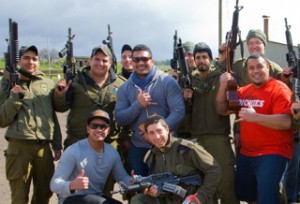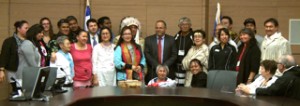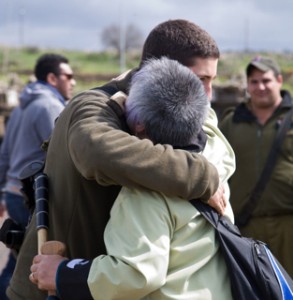In February 2012 indigenous peoples from some of the farthest reaches of the earth visited the Holy Land. These deeply committed Christians hailed from places like the Canadian and Greenland arctic, the islands of Fiji and Samoa, Australia and New Zealand as well as First Nations Canadian communities. They had come to Israel to return thanks and bless the people of Israel through native sounds, songs and dance.
Everywhere they went – an Israeli army base, a hospital, the Holy Sites, the Knesset and Jewish, Arab Palestinian and Christian schools – they were received with open arms.
“I think today was very significant, said Rittie Katz, a teach at The Jerusalem School, in East Jerusalem. The kids who go to school here should have some cheer, some happiness and some joy. We will teach them about the [indigenous people] and … about other displaced people who have maintained their culture.”
Led by Rev. Roger Armbruster of Canada Awakening Ministries, the indigenous peoples were welcomed at the Israeli Parliament, and met with Member of Knesset Ayoob Kara. “I am very happy to be here with all of you,” said MK Kara, Deputy Minister of Development of the Negev and Galilee. “Because you are the First Nation and the Jews and Druze are the first nation[s] of this area, we have something that could be of cooperation.”
“We find as First Nations, the Israelis are very open to us,” noted Pastor Raymond McLean of the First Nations’ Family Worship Centre in Winnipeg, Manitoba. “It seems they are able to relate to our experiences because we too have experienced hardships as far as land and everything else. [The Israelis] are able to open up to us in a way that they aren’t normally able to do with other nations.”
McLean added, “Israelis are so intrigued when they see us. They say, ‘Are you an Indian for real?’ They would literally touch us.”
Why such a deep connection between the indigenous peoples and the people of Israel? As a tribal people they relate to Israel as a tribal nation because the people of Israel originated from the twelve tribes of Jacob.
“We are obviously the first nation of Israel and they are the first nations of their communities,” observed Josh Reinstein, director of the Christian Allies Caucus. “I think that is what brings us together.”
The G rand Chief David Harper of Manitoba’s Keewatinowi Okimakanak recognized the bond as well, but suggested that it goes even deeper. “We have a connection … They are the original people of this land, and we … [need to] flourish the way the children of Israel flourish in their land. And our [native] songs, [with the words] Hey ya! – those are Hebrew words calling on God.”
rand Chief David Harper of Manitoba’s Keewatinowi Okimakanak recognized the bond as well, but suggested that it goes even deeper. “We have a connection … They are the original people of this land, and we … [need to] flourish the way the children of Israel flourish in their land. And our [native] songs, [with the words] Hey ya! – those are Hebrew words calling on God.”
Seven and a half thousand kilometers from her community in the Canadian arctic, first-time visitor Elisapi Davidee-Aningmiuq found the trip to be a “homecoming.”
“I felt it would be an honour and privilege to go to the grounds where Jesus walked. For me that was a very big thing. Since I have been here, my soul feels like it is … home. I am so at peace inside…. It is wonderful!”
Local Israelis perceive the indigenous peoples’ visit to the Holy Land as a prophetic sign. “Biblically speaking,” said Reinstein, “the nations from all over the world will come to Jerusalem to be a blessing to Jerusalem, so it is really exciting to see this … prophecy being fulfilled right before our very eyes.”
McLean elaborates. “I believe this is [the] prophetic event…spoken by the prophets in Isaiah 60 and 61 about the … gentile nations blessing Israel. I believe … this is a fulfillment of the Word of God.”
The visit of the indigenous people to Israel indicates that 2000 years after Jesus’ life on earth his message has extended to the farthest reaches of the globe – something Jesus himself said would take place as a signal and a sign of the days prior to his return.
Marney Blom is news director for the Acts News Network.
Copyright © Acts News Network, Inc.

